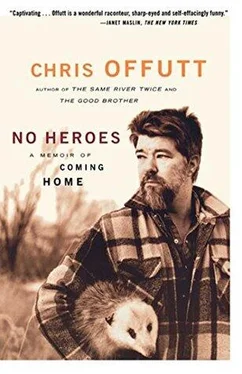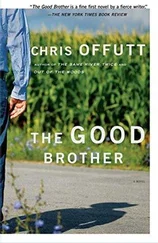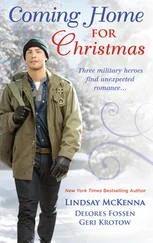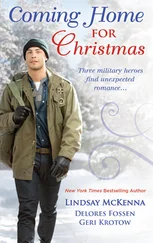“Hey, Chris,” he said. “How do you teach writing?”
“That’s a good question, Harley. What do you think?”
“Well, if it was me, I’d say to just let them write what was on their mind.”
“That’s what I’ll tell them.”
“You sure you can’t slip up here for a minute?”
“Thanks, but no.”
I watched him climb the hill. Like most people from Haldeman, Harley made it through eighth grade but not high school. He left the sidewalk for the woods and I saw flashes of his shirt moving through the trees as he headed for his spot, the highest point overlooking campus. I knew that he would get stoned, drink a beer, and take a nap. He would awaken thirsty, his head cloudy. He’d smoke a cigarette and check his pockets for money, hoping for enough to buy a bottle of Ale-8 and a Slim Jim at a gas station. Then he’d walk the road until someone picked him up and drove him somewhere. I knew all this because I’d once lived the same way.
A particular quirk of mountain people is to go home as often as possible. Appalachian workers in Ohio factories commonly drive all night after Friday’s shift to reach the hills by Saturday morning. This trait has given rise to a joke about hillbillies being chained in Heaven to prevent them going home on the weekends. College students were no exception, and Morehead is known as a “suitcase school,” meaning that the vast majority of students went home on Friday.
I walked into my first class late. The students sat in rigid rows of school desks. I announced the name of the class and asked if everyone was in the right room. No one spoke or nodded. I told them to call me by my first name. A few blinked in surprise. At MSU, most professors insist upon being called “Doctor.” I gave each student a copy of my course description, read it aloud, and asked for questions. There were none. A long silence ensued during which I looked out the window at maintenance workers busily primping the president’s home. When I returned my attention to the students, everyone looked at me, then away. I dismissed class. They left swiftly without a word.
I walked downstairs and sat in the dimly lit theater where the plays I wrote as a student had been produced. The first one was a futuristic retelling of Oedipus Rex with a punk rock soundtrack. All the actors wore sunglasses. To gain entry to a gang, Eddie slept with a hooker who turned out to be his mother, and set fire to a wino who was later revealed as his father. Instead of blinding himself at the climax, Eddie removed his sunglasses. This last part I considered a stroke of genius. The music included “The Blank Generation” by Richard Hell, who was not only a Kentuckian but had been born in the same hospital as me. For a few years we had lived half a mile apart in Lexington. After graduation my plan was to leave Kentucky forever. Now I was back at MSU and Richard Hell was fifty years old.
I checked the time and went upstairs to teach another class in much the same fashion as the first. Afterward I walked to the old courthouse and ate a sack lunch. A torpor settled over me like a quilt of sand. It was as though I were inhabiting the past and the future simultaneously, encased in a swaddling that forbade access to the present. I couldn’t be a teacher until shedding the memory of being a student.
My graduate fiction writing class met in the same room where I’d been interviewed, with comfortable chairs surrounding tables pushed together. The students included a transfer student from China with extremely limited skills in English. Another was a nontraditional undergraduate who was older than me and tried incessantly to establish common points of reference through geography, event, and people’s last names. Another man wanted to tell me what he found objectionable with my books. One young man admitted that he was trying to raise his GPA by taking an easy course. Two women were high school teachers who would get a pay raise after completing the class. We talked briefly about the kind of writing we were interested in pursuing, a gamut that included horror, science fiction, romance, and “Little House on the Prairie type books.” After class the nontraditional student lingered.
“Ever hear of Andrew Offutt?” he said.
“Yes.”
“Is he kin?”
“He’s my father.”
“I heard he was at a party with some guy with only one arm. Your daddy yelled out he was going tear that guys other arm off.”
I nodded and the guy left.
I’d become accustomed to Andy Offutt stories all my life. Everyone in the county told them. In fact, my father told this same story often, each time with a rising pride that I never fully comprehended. The one-armed guy had been an MSU administrator, now retired.
The late-afternoon class was Intro to Creative Writing, filled with sophomores and juniors. One student set the tone by claiming that expecting him to turn in assignments interfered with his artistic freedom. He then stomped out, slamming the door. Everyone waited for my reaction.
“Well,” I said, “I think we just found a real writer. He knows as well as I do that it’s impossible to teach writing. I can help you all learn to revise, but you have to write your own first draft. Any questions?”
A young man slouching in the back row raised his hand and spoke. “You care what we write about?”
“Nope. No rules.”
“Good, I don’t like rules.”
“Me, neither,” I said. “And neither did the guy who left.”
People laughed and I told them about painting the curbs in front of the very building we were in. A young woman named Sandra said she understood “no rules,” but she didn’t always know what to write about.
“That’s a good question,” I said. “This morning a friend of mine suggested that I tell you all to write whatever’s on your mind.”
I told them about Harley and their attention became downright perky when I mentioned that he had some dope.
“Write what you care about,” I said. “Write what hurts you. If there’s someone whose approval you want, write about that person.”
“What if that’s all the same person?”
“Then you’re lucky,” I said. “You have a lifetime’s worth of material.”
I ended class shortly after that. The student from the back row ducked back into the room. He wore a flannel shirt over a gangsta-rap T-shirt. His body was marked by tattoos and piercings. Portable stereo headphones dangled around his neck. I asked his name.
“Eugene from Martin County.”
I shook his hand and he frowned.
“What’s wrong?” I said.
“No teacher ever did that before.”
“I’ll have to speak to them about that.”
“Do you like to read?” he said.
“Sure do,” I said. “You?”
“Yes and no. Not what they make you read, but what I like.”
“I know what you mean. What do you like to read?”
“Short stories.”
“Me, too. Is there any writer you like?”
“I’ve read James Still, Gurney Norman, and Chris Holbrook.”
“Good. You started with the Kentucky writers and now you can expand from there. Why don’t you let me bring you a couple of books next class?”
“Buddy, you got a deal.”
He nodded and left. I realized that if I were nineteen today, I’d be tattooed like a comic book, with more metal hanging off me than a tackle box. Any play I wrote would have a hip-hop score. I watched Eugene leave, feeling as if I’d found the student I came home to teach.
Sam and James Learn About the Holocaust
Sam is reading Maus, a comic book about the Holocaust that depicts Jews as mice and Nazis as cats. Rita worries about the effect on Sam because she learned of her parents’ experience at age twelve by watching a film that featured footage from the camps. Until then, she had no idea what her parents had endured.
Читать дальше












